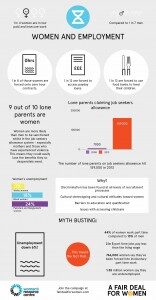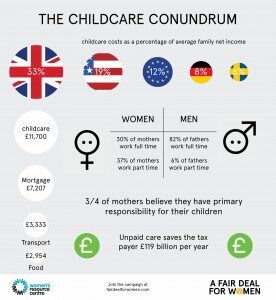
****Vital updates to this page coming soon! In the mean time, view our new report here http://womenspeakout.wrc.org.uk/report/ ‘****
Even though girls outperform boys at school, women typically earn less and work in lower paid jobs, part-time jobs, and insecure jobs. Why is this the case?
- discrimination during the recruitment process
- discrimination during promotion and wage reviews
- stereotyping into lower paid sectors
- cultural stereotyping encourages women into; care work, the public sector, social services, domestic work, and secretarial jobs
- 51% of women and men from middle management to director level identify stereotyping as the major hurdle facing women at work
- the gender pay gap
- the gender pay gap increased for the first time in 2013 and is now 19% (i.e. women earn only 81p for every £1 that men earn)
- the ‘gender pension gap’ is even higher, at 43%
- pregnancy discrimination
- An estimated 60,000 women per year are sacked for being pregnant
- care responsibilities and high childcare costs
- 37% of mothers work part time, while only 6% of fathers work part time
- childcare costs in the UK are among the highest in the world and British parents are spending more on childcare than on mortgages
And these issues have only got worse since the crash in 2008. Here are some statistics that may surprise you…
- 1 in 4 women (compared to 1 in 7 men) are working in low paid and insecure work
- 1 in 8 of those women are working on zero hours contracts
- 1 in 10 of those women have been forced to access payday loans
- 1 in 12 of those women have had to go to food banks to feed themselves and their children
- 5% of white women, 11% of Black women, 10% of Asian and 9% of women from other ethnic backgrounds are unemployed

Sources
The mix of barriers to employment, low paid and insecure work, and childcare issues make it extremely difficult for women to attain financial security. Add to this the cuts to public services and the overall situation for women has become much more difficult.
It is that much more difficult for them to leave abusive relationships, because they are often left with nothing, leaving them and their children destitute if they leave.
Discrimination in work
Discrimination has been found at all levels of the recruitment process. Cultural stereotyping. Cultural attitudes towards women. Barriers to education and qualifications. Issues accessing childcare.

Click for full sized infographic
Sources
Women’s charities provide a range of services that support women’s access to, retention and progress in work, including training, education and career advice. They work with some of the most vulnerable, isolated, and disadvantaged women to break down barriers for women in employment. They also provide specialist advice and information to tackle gender and racial discrimination.
What can Parliament do?
- Take steps to improve women’s access to, retention, and progression in work
- Increase the minimum wage
- Take action on discrimination in the workplace, including pregnancy and maternity discrimination
- Take action on the gender pay gap by putting into place laws that monitor levels of pay by big business
- Develop a national strategy on good quality, affordable childcare
- Develop and promote family friendly policies to support women carers to stay and progress in work
Sources
Share on FacebookShare on Twitter
